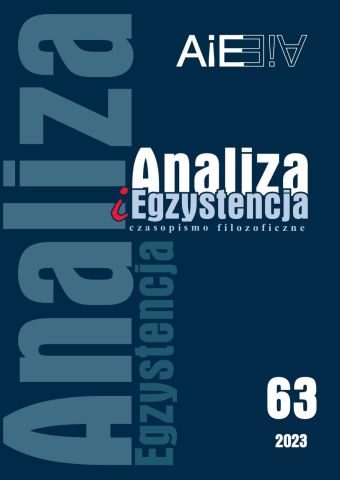
ISSN: 1734-9923
eISSN: 2300-7621
OAI
DOI: 10.18276/aie.2023.63-02





Lista wydań /
63 (2023)
Towards a Computational Ontology for the Philosophy of Wittgenstein: Representing Aspects of the Tractarian Philosophy of Mathematics
| Autorzy: |
Jakub
Gomułka

Akademia Górniczo-Hutnicza w Krakowie |
| Słowa kluczowe: | Ludwig Wittgenstein Semantic Web Knowledge Representation Tractatus Logico-Philosophicus Philosophy of Mathematics |
| Data publikacji całości: | 2023 |
| Liczba stron: | 28 (27-54) |
Abstrakt
The present paper concerns the Wittgenstein ontology project: an attempt to create a Semantic Web representation of Ludwig Wittgenstein’s philosophy. The project has been in development since 2006, and its current state enables users to search for information about Wittgenstein-related documents and the documents themselves. However, the developers have much more ambitious goals: they attempt to provide a philosophical subject matter knowledge base that would comprise the claims and concepts formulated by the philosopher. The current knowledge representation technology is not well-suited for this task, and a non-standard approach is required. The creators of the Wittgenstein ontology project are aware of this fact; recently, they have been discussing conceptual devices adjusting the technology to their needs.
The main goal of this paper is to present examples of a representation of philosophical content that make use of both the devices already proposed and some new inventions. The represented content comes from the Tractatus Logico-Philosophicus; more specifically, its theses concerning the problems in philosophy of mathematics.
Pobierz plik
Plik artykułu
Bibliografia
| 1. | Dean, M., Schreiber, G., Bechhofer, S., Harmelen, F. van, Hendler, J., Horrocks, I., McGuinness, D.L., Patel-Schneider, P.F., Stein, L.A. (2009). OWL Web Ontology Language: Reference. W3C, <https://www.w3.org/TR/owl-ref/> (access: 30.09.2022). |
| 2. | Mácha, J., Falch, R., Pichler, A. (2013). Overlapping and Competing Ontologies in Digital Humanities. In: F. Tomasi, F. Vitali (eds.), DH-CASE ’13: Proceedings of the 1st International Workshop on Collaborative Annotations in Shared Environment: metadata, vocabularies and techniques in the Digital Humanities (10 September 2013, Florence, Italy), ACM. |
| 3. | Pichler, A., Gjesdal, Ø.L., Ruwehy, H.A. (2007 – work in progress). Wittgenstein ontology. WAB, <http://wab.uib.no/cost-a32_philospace/wittgenstein.owl> (access: 30.09.2022). |
| 4. | Pichler, A., Fielding, J.M., Gangopadhyay, N., Opdahl, A.L. (2021). Crisscross ontology: Mapping concept dynamics, competing argument and multiperspectival knowledge in philosophy. Quaderni di “Filosofia”, 2, pp. 59–73. |
| 5. | Potter, Michael (2008), Wittgenstein’s Notes on Logic, Oxford: Oxford University Press. |
| 6. | Rosse, C., Mejino, J.L.V.Jr. (2003). A Reference ontology for bioinformatics: The foundational model of anatomy. Journal of Biomedical Informatics, 36, pp. 478–500. |
| 7. | Smith, B., Köhler, J., Kumar, A. (2004). On the application of formal principles to life science data: A Case study in the Gene Ontology. In: R. Erhard (ed.), Data Integration in the Life Sciences. DILS 2004. Leipzig. Lecture Notes in Computer Science (pp. 79–94). Springer, pp. 79-94. |
| 8. | Stern, D. (2019). The Structure of Tractatus and the Tractatus Numbering System. In: Ch. Limbeck-Lilienau, F. Stadler (eds.), The Philosophy of Perception: Proceedings of the 40th International Ludwig Wittgenstein Symposium (pp. 377-398). De Gruyter, pp. 377–398. |
| 9. | Wittgenstein, L. (1965). Tractatus Logico-Philosophicus. transl. D.F. Pears, B.F. McGuinness, London–New York: Routledge and Kegan Paul. |
| 10. | Zöllner-Weber, A., Pichler, A. (2007). Utilizing OWL for Wittgenstein’s Tractatus. In: H. Hrachovec, A. Pichler, J. Wang (eds.), Papers of the 30th International Ludwig Wittgenstein Symposium (5–11 August 2007, Kirchberg am Wechsel) (pp. 249–251). Kirchberg am Wechsel: ALWS. |